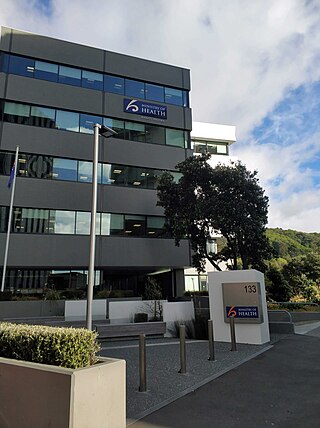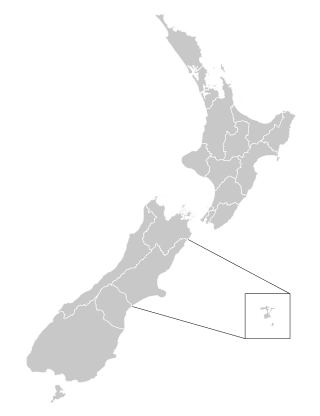The Department of Corrections is the public service department of New Zealand charged with managing the New Zealand corrections system. This includes the operations of the 18 prisons in New Zealand and services run by Probation. Corrections' role and functions were defined and clarified with the passing of the Corrections Act 2004. In early 2006, Corrections officially adopted the Māori name Ara Poutama Aotearoa.

Problem gambling, ludopathy or ludomania is repetitive gambling behavior despite harm and negative consequences. Problem gambling may be diagnosed as a mental disorder according to DSM-5 if certain diagnostic criteria are met. Pathological gambling is a common disorder associated with social and family costs.

The Ministry of Health is the public service department of New Zealand responsible for healthcare in New Zealand. It came into existence in its current form in 1993. The organisation was founded in 1901 as the Department of Public Health in 1901, and was renamed to Department of Health in 1922.

District health boards (DHBs) in New Zealand were organisations established by the New Zealand Public Health and Disability Act 2000 under the Fifth Labour Government, responsible for ensuring the provision of health and disability services to populations within a defined geographical area. They existed from 1 January 2001, when the act came into force, to 30 June 2022. Initially there were 21 DHBs, and this was reduced to 20 organisations in 2010: fifteen in the North Island and five in the South Island. DHBs received public funding from the Ministry of Health on behalf of the Crown, based on a formula that took into account the total number, gender, age, socio-economic status and ethnic mix of their population. DHBs were governed by boards, which were partially elected and partially appointed by the minister of Health.

The Entertainment Community Fund, formerly The Actors Fund, is a 501(c)(3) charitable organization that supports performers and behind-the-scenes workers in performing arts and entertainment, helping more than 17,000 people directly each year. Serving professionals in film, theatre, television, music, opera, radio, and dance, the Fund's programs include social services and emergency financial assistance, healthcare and insurance counseling, supportive and affordable housing, and employment and training services. The Fund owns and operates the Lillian Booth Actors Home, a skilled nursing and assisted living facility in Englewood, New Jersey.
Psychiatric rehabilitation, also known as psychosocial rehabilitation, and sometimes simplified to psych rehab by providers, is the process of restoration of community functioning and well-being of an individual diagnosed in mental health or emotional disorder and who may be considered to have a psychiatric disability.

The British Columbia Lottery Corporation is a Canadian Crown corporation that manages all legal gambling products in British Columbia including lottery tickets, casinos and online gambling. It is based in Kamloops, with a secondary office in Vancouver. It consists of three business units: Lottery, Casino and eGaming. Its annual revenues exceed CDN $1.6 billion. It has 890 direct employees. Its service providers, who run casinos on its behalf under contract, have an additional 8,300 employees.
Gambler's Help is a network of agencies funded by the State Government in Victoria, Australia to provide a range of community served for gambling related issues. Gambler's Help is administered by the Victorian Responsible Gambling Foundation, but receives funding from the Community Support Fund which receives a portion of the profits from the operation of gaming machines in Victoria.

The healthcare system of New Zealand has undergone significant changes throughout the past several decades. From an essentially fully public system based on the Social Security Act 1938, reforms have introduced market and health insurance elements primarily since the 1980s, creating a mixed public-private system for delivering healthcare.
The French health care system is one of universal health care largely financed by government national health insurance. In its 2000 assessment of world health care systems, the World Health Organization found that France provided the "best overall health care" in the world. In 2017, France spent 11.3% of GDP on health care, or US$5,370 per capita, a figure higher than the average spent by rich countries, though similar to Germany (10.6%) and Canada (10%), but much less than in the US. Approximately 77% of health expenditures are covered by government-funded agencies.
Legal aid in the United States is the provision of assistance to people who are unable to afford legal representation and access to the court system in the United States. In the US, legal aid provisions are different for criminal law and civil law. Criminal legal aid with legal representation is guaranteed to defendants under criminal prosecution who cannot afford to hire an attorney. Civil legal aid is not guaranteed under federal law, but is provided by a variety of public interest law firms and community legal clinics for free or at reduced cost. Other forms of civil legal aid are available through federally-funded legal services, pro bono lawyers, and private volunteers.
The National Council on Problem Gambling is an American nonprofit organization. Founded in 1972 by Joseph A. Dunne and Robert Custer, among others, it is the oldest organization on gambling issues in the United States. The Council established two principles:
The Hong Kong Federation of Youth Groups is a non-profit organization in Hong Kong, committed to develop youth services. Founded in 1960, the Federation has since been involved in providing activities and facilities for the physical, social, educational, cultural development of Hong Kong's youth.
The UCSF Alliance Health Project (AHP), formerly the AIDS Health Project, is a 501(c)(3) nonprofit organization that provides mental health and wellness services for the HIV/AIDS and LGBTQ communities in San Francisco. It is part of the University of California, San Francisco Department of Psychiatry. In addition to direct service to individuals, it also undertakes HIV prevention and LGBTQ mental health research and educates mental health and health care providers about best practices.
The Responsible Gambling Fund (RGF) advises the Government of New South Wales (NSW) in Australia on the allocation of funds for initiatives and programs that support responsible gambling and reduce gambling addiction in the state.
Clinical mental health counseling is a healthcare profession addressing issues such as substance abuse, addiction, relational problems, stress management, as well as more serious conditions such as suicidal ideation and acute behavioral disorders. Practitioners may also assist with occupational growth in neurodivergent populations and behavioral and educational development. Clinical mental health (CMH) counselors include psychologists, psychiatrists, mental health technicians, marriage counselors, social workers, and family therapists.

Transgender and non-binary people in New Zealand face discrimination in several aspects of their lives. The law is unclear on the legal status of discrimination based on gender identity, and also for intersex people.

The Hawke's Bay District Health Board was a district health board with the focus on providing healthcare to Hawke's Bay, New Zealand. In July 2022, it was merged into the national health service Te Whatu Ora.







